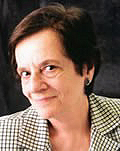Is an honest society possible?
LAW Professor Tamar Frankel says it’s up to us

During 37 years on the School of Law faculty, Tamar Frankel has written textbooks on mutual funds, securitization, and the regulation of investment management. She has been a visiting scholar at the Securities and Exchange Commission and was on the commission that established the structure of the Internet. She has become a resource for national business reporters needing an expert’s perspective. And she has watched American business ethics deteriorate.
Concerned by the trend over the past three decades of increasing tolerance of dishonesty and financial abuse, Frankel has written a disturbing analysis of where America has gone wrong — and how to revive itself.
Trust and Honesty: America’s Business Culture at a Crossroad (Oxford University Press) traces how temptations and opportunities to defraud have risen while legal and moral barriers to trust have declined and now threaten our prosperity. To reverse this trend, Frankel says, Americans must demand of their leaders, of themselves, and of one another more honesty and trust and less cynicism — a utopian ideal, but a necessary cultural aspiration.
Trust and Honesty has gained a global audience. Internetbar.org, a virtual bar association, in a first-of-its-kind symposium, staged a 10-day online dialogue discussing Frankel’s book and its suggestions about the road to a more ethical society. Participants from the United States, Africa, the Middle East, and Southeast Asia concluded with the goal of creating a permanent cyber network to keep open the discussion of such issues and help the legal profession lead an effort to establish greater trust around the world.
Frankel recently discussed her book with BU Today. She will speak about it at Boston University Campus Store on Monday, December 12, at 7:30 p.m.; the discussion is free and open to the public.
Q: Isn’t dishonesty just business as usual in America?
Frankel: Not yet. But we are moving in that direction. Most Americans are honest and trustworthy people. But if they expect dishonesty, they might accept and even justify it. This expectation is dangerous. People may protect themselves from fraud by suspecting everyone they do not know well. They may cease to interact with others or start copying dishonest people who seem to be successful. The price of both reactions is devastating to our economy and well-being.
Q: What factors have led to the erosion of trust and honesty in recent years?
Frankel: We cannot prove what causes change in our complex society, but we examine the environment and judge for ourselves. What we have seen is that while respect for morality and law has gone down, belief in the market’s invisible hand and rules has gone up. Professionals, the “gatekeepers” of honesty — the accountants and the lawyers — have become businesspeople, with this difference: professionals are committed to society first and to profits second; businesspeople are committed to profits first and second. Meantime, economics has often undermined the spirit of the law. Principles have been substituted for cost-benefit analysis. And I could go on.
Q: How can we move back toward an honest society?
Frankel: The first step is to be aware of the change. The second is to recognize the harm of this change and the danger that it will become our permanent culture. The third is trying to restore the balance between morality and law and the justice of the market. The most important part is enforcement: not the police and not even the leadership can make the change. It is each and every one of us that must make it and demand it of each other. Keep the “realistic cynics” away and isolated. Do not allow them to contaminate us.
Q: Isn’t complete honesty in any society an unreachable goal?
Frankel: Sure it is. We will always have con artists and charlatans at the fringe. But we should reject them as symbols of success. As I wrote, we can aspire to “become an honest society and to have our society reap the rich rewards of honesty . . . It is Utopia, which we cannot realize. But it can guide our life every day. ‘A man’s reach should exceed his grasp,’ wrote Robert Browning. A society’s reach towards honesty should exceed its grasp as well. It is not reaching that ideal, but striving towards it, that makes an honest society.”